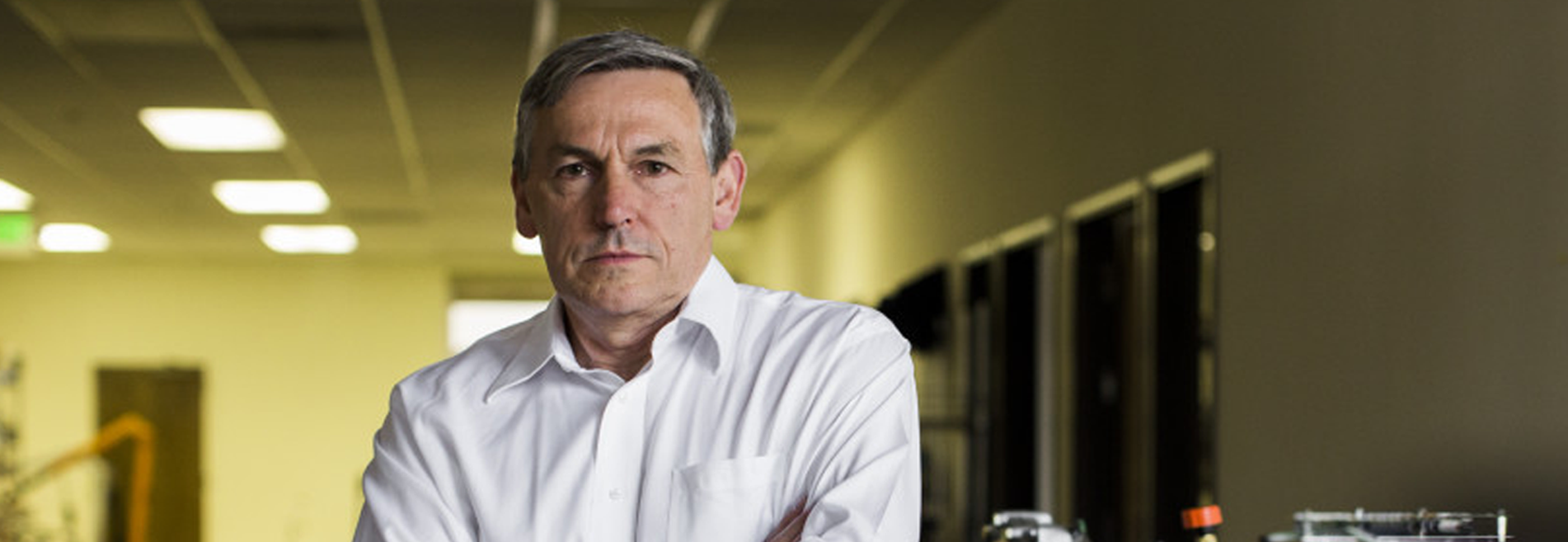Ian Wright is a New Zealand engineer who co-founded Tesla Motors in 2003. He moved on to create the world’s fastest street-legal electric car, and he's now cleaning up the dirty world of garbage trucks with his new company WrightSpeed. He talks to Insight about how it all began.
What did you study at AUT?
I completed a NZ Certificate in Telecommunications. It was a four-year course.
What did that involve?
It was basically electrical engineering, it originally came out of requirements the Post Office had for training technicians.
What was your first job after AUT?
My first job was in a factory that made televisions in Onehunga. I was a technician on the production line testing and fixing things that didn’t work. I learnt quite a lot about how things failed and how to diagnose them and test.
Then I joined a company that built radio stations and recording studios. It was founded by the guys who started Radio Hauraki. I worked for them building Radio Pacific, and I did the design of all the studio mixers. That gave me a taste for electronics design, and after working in Sydney I eventually headed to the US where I joined Cisco and started the Terabyte IP Router Project.
"We hire a lot of engineers out of US schools and I have to say it is profoundly shocking to me that we can interview a master of electrical engineering and they do not know how a capacitor or inductor works."
Later on I bought a company in the UK. Quest was our lead customer, and we were almost on the brink of signing with them when we had the big telecoms meltdown in 2000. Overnight all the carriers just stopped spending any money on capital for the next five years.
I'd been an amateur race-car builder and driver in the past, and so when I met two guys with an interesting idea for an electric vehicle startup, I jumped at the chance.
So I joined the other guys (founders Marc Tarpenning and Martin Eberhard) and we started Tesla, and the rest is history.
So are electric cars going to save the world?
The trouble with making electric cars is that companies are competing with city cars which are already pretty good - they're cheap, very low pollution and they don’t burn much fuel. So we looked at the opposite - the least fuel efficient and highest polluting vehicle - which is garbage trucks. A city car burns 750 litres a year, a garbage trucks burns 52,000 litres a year. We can reduce that by 60 percent.
This technology is such a great fit for an application like a garbage truck that I think in five years heavy duty diesel engines will disappear from inside cities. They will still be used for long haul but inside cities you will see them phased out and then city transit buses will be next.
Who are your customers?
Mack trucks was one of the first truck manufacturers approach us, and they have 50 percent of the market so that’s a big deal for us. We’ve now got US$40 million of orders, we’re on our fourth generation gear box and we’re scaling it up to do heavy garbage trucks in the US and city buses in Wellington, New Zealand.
And what projects would you like to pursue in the future?
I'm tempted to get the right people together and start a competing electric car race formula, because I think it could be so much more entertaining for the viewers. That's the mistake with the message around electric cars - ‘you should buy it because its electric and it saves the planet' - but actually you should buy it because it's more fun to drive, and the same goes for racing. Who wants to watch the racing series just because it’s electric? If it doesn’t make the right noise and it's boring to watch, people won’t watch, so I like to think about how you could make it exciting, while still reducing the carbon emission.
The type of electric cars that haven’t really been explored yet are the high performance vehicles. BMW, Mercedes, Porsche and McLaren all have some kind of Formula E hybrid arrangement, but I know we can do better. So you’ll start seeing some pretty interesting high performance road cars - they'll be low volume, but a lot of fun and will shake things up.
AUT prides itself on offering programmes that balance theory with the ability to apply it. What sort of graduates do you hire?

We hire a lot of engineers out of US schools and I have to say it is profoundly shocking to me that we can interview a master of electrical engineering and they do not know how a capacitor or inductor works, they can’t design an analogue circuit, they can write some code, they can pass exams but they don’t actually, at a fundamental level, understand electronics.
Ian’s innovation journey
After Tesla, Ian founded WrightSpeed and developed the world’s fastest street-legal electric car in 2005. To his delight, the car beat several sports cars including a Ferrari and a Carrera GT in a drag race. However, Ian struggled to get the investment money needed to develop his technology.
Then came the lightbulb moment: if instead of building an entirely new car, he could instead just redesign the powertrain, which could then be retrofitted into existing vehicles. By focusing on the most polluting vehicles, such as commercial fleet trucks, he estimates his potential market is worth around US$16 billion.
The retrofit powertrain idea means fuel costs are significantly reduced and the engines meet the most stringent carbon emission standards. Wright’s plant is based in the heart of Silicon Valley, San Jose, California and has been supported by grants from the California Energy Commission that promote clean technology.
So we talk to the person and find out what they really know, whether they think like an engineer, have a fundamental understanding of the physics, and if they can actually design something from scratch. Do they know anything at all about how to run a project, manage suppliers and other dependencies?
The most powerful question in engineering is ‘what problem are we solving? As an employer we look at someone's project and we don’t care if it worked or not, we care about whether they understood why it worked or not, and whether they can explain it. That's worth more to us than any grade point average.
"Don’t buy an electric car because it saves the planet, buy one because it’s much more fun to drive and it also happens to be electric. You're going to start seeing some pretty interesting high performance road cars - they'll be a lot of fun and will shake things up."

